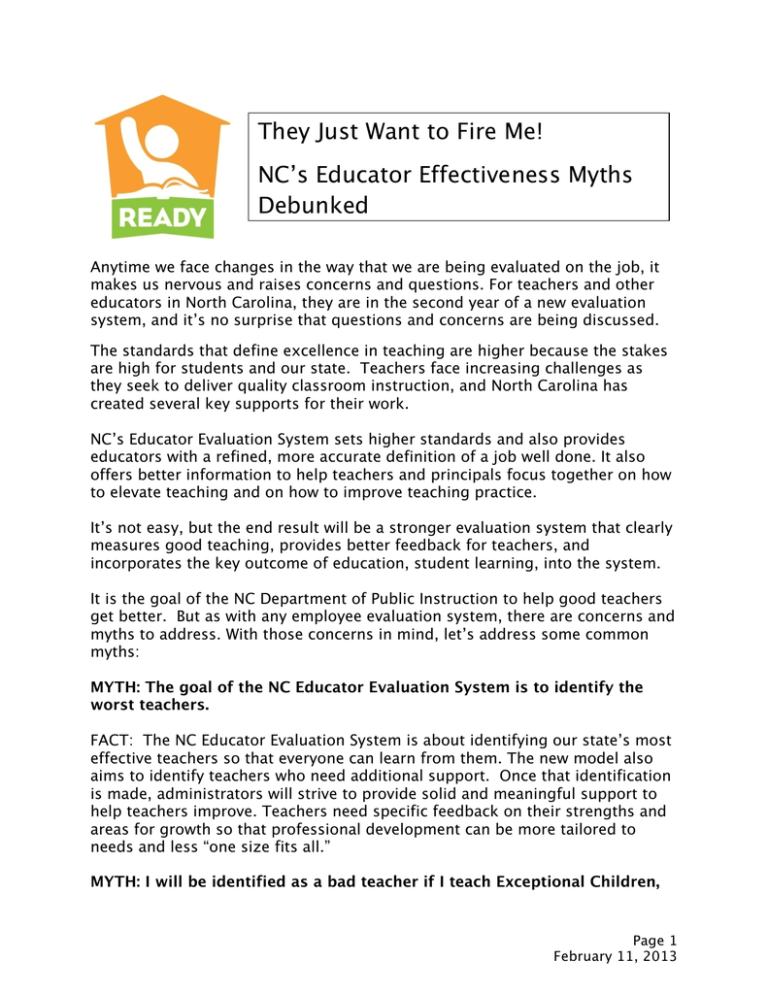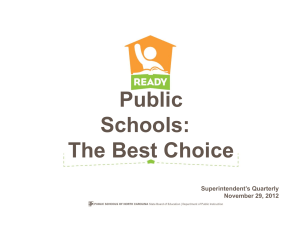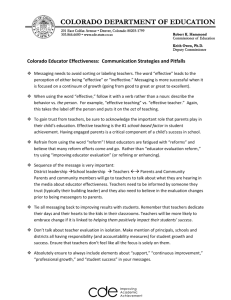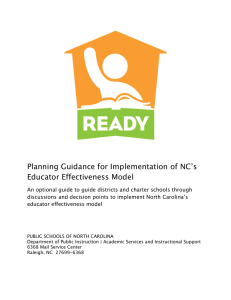They Just Want to Fire Me! NC’s Educator Effectiveness Myths Debunked
advertisement

They Just Want to Fire Me! NC’s Educator Effectiveness Myths Debunked Anytime we face changes in the way that we are being evaluated on the job, it makes us nervous and raises concerns and questions. For teachers and other educators in North Carolina, they are in the second year of a new evaluation system, and it’s no surprise that questions and concerns are being discussed. The standards that define excellence in teaching are higher because the stakes are high for students and our state. Teachers face increasing challenges as they seek to deliver quality classroom instruction, and North Carolina has created several key supports for their work. NC’s Educator Evaluation System sets higher standards and also provides educators with a refined, more accurate definition of a job well done. It also offers better information to help teachers and principals focus together on how to elevate teaching and on how to improve teaching practice. It’s not easy, but the end result will be a stronger evaluation system that clearly measures good teaching, provides better feedback for teachers, and incorporates the key outcome of education, student learning, into the system. It is the goal of the NC Department of Public Instruction to help good teachers get better. But as with any employee evaluation system, there are concerns and myths to address. With those concerns in mind, let’s address some common myths: MYTH: The goal of the NC Educator Evaluation System is to identify the worst teachers. FACT: The NC Educator Evaluation System is about identifying our state’s most effective teachers so that everyone can learn from them. The new model also aims to identify teachers who need additional support. Once that identification is made, administrators will strive to provide solid and meaningful support to help teachers improve. Teachers need specific feedback on their strengths and areas for growth so that professional development can be more tailored to needs and less “one size fits all.” MYTH: I will be identified as a bad teacher if I teach Exceptional Children, Page 1 February 11, 2013 low-achieving students or in a low-achieving school. FACT: Data from the Educator Value-Added Assessment System (EVAAS) show that some of the most effective teachers in the state are those who teach EC students or students who are struggling with academics. Teachers in lowachieving schools receiving support from NCDPI also tend to fare well on EVAAS scores. It is critical to remember that EVAAS and the NC Educator Evaluation System focus on growth, not proficiency. MYTH: Common sense will tell us who the good teachers are. FACT: Anyone who teaches knows that it is a profession that involves a complex set of skills, talents and frequent decisions about serving each student’s needs. There are numerous methodologies, strategies and activities that comprise great teaching. “Good teaching” manifests itself in a variety of ways. One of the primary ways is in higher outcomes for students. We must assess good teaching by taking a closer look at the five standards that have been employed, with the addition of the sixth standard that measures student growth. This provides a richer, more comprehensive context for evaluation. MYTH: If some of my students do not show growth during the school year, I am going to be fired. FACT: NC’s Educator Evaluation System requires the use of three years of student growth data – potentially hundreds of students, for a high school teacher – before there are required interventions for teachers who do not make expected growth with students. Those interventions include monitored or directed growth plans and time to improve, but they do NOT include automatic dismissal. MYTH: Everyone knows that teachers don’t improve noticeably after their fourth or fifth year in the classroom. This means that longer-term teachers might be at higher risk with the new evaluation system. FACT: Some research suggests that there can be a “plateau” effect among teachers who have been in the profession for several years. The NCDPI acknowledges, however, that this does not have to be the case, and that we all are responsible for avoiding this phenomenon. Teachers, just like our students, should be constantly growing and honing their craft. A closer look at the types of professional development that the NCDPI and local districts can offer teachers must be a part of an overall strategy to Page 2 February 11, 2013 retain good teachers and ensure that they grow in their profession, just as we expect students to continually grow in their learning. MYTH: The new evaluation system will mean that we will be testing students more, in order to assess teachers. FACT: The only tests that are being added are the common exams, which will provide a method for assessing student growth for subject areas that have not traditionally been tested, such social studies. These will be important in – but only one part of – assessing teachers’ performance. There will be no tests added in courses/subjects that have traditionally required end-of-course or end-of-grade tests. In order for the NC Educator Evaluation System to be fair of all teachers, everyone must have a measure of how their teaching impacts the learning of their students. Teams of NC teachers are developing the common exams, and they should replace final exams that were previously created by individual teachers Page 3 February 11, 2013





